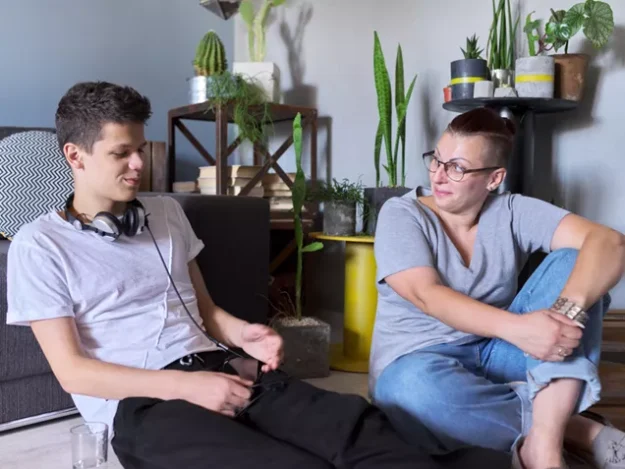Fostering teenagers can be a challenging but extremely rewarding profession. Just like every teenager, young people in care will experience the typical teenage struggles and challenges, but with the added weight of a potentially traumatic background.
Due to their difficult past, as well as the changes and stresses that come with adolescence, many young people in care suffer from low self-esteem. But exactly what causes low self-esteem in young people in care, and how can you help boost it?

What is self-esteem?
While self-esteem is something we feel on the inside, it can be influenced by the things going on in our lives, social media, our strengths and weaknesses, and the people who surround us. Self-esteem isn’t something that stays still – it’s ongoing and can be built up or broken down over time.
In basic terms, self-esteem is about knowing and believing in your self-worth and how you feel about yourself. Someone with low self-esteem is probably not very confident and might have the tendency to see things in a negative light, while someone with high self-esteem is more likely to be confident, have self-love, and sees things positively.
Having healthy self-esteem, especially as a young person, is incredibly important. It can affect how you feel and how you behave, and have a big impact on not just your mental health, but your future; from applying to jobs and becoming independent to forming relationships with friends and potential partners.
Offering your support for children in foster care and helping them to build their self-esteem can make a huge difference to their outlook for the future.
What causes low self-esteem in young people in care?
If a young person has healthy self-esteem, they generally have a positive outlook on life and feel good about themselves. If they are faced with a difficult situation, they’ll probably be able to cope and deal with them better. This in turn means that challenges are less likely to have a long-term impact.
On the flip side, a teenager with low self-esteem might focus on their mistakes, criticisms, or personal weaknesses. This can make it much harder for them to look at the things they are good at or the positive things going on in their lives. Having low self-esteem also makes it easier to blame themselves for anything bad happening to or around them.
So, what causes low self-esteem in childhood, particularly in young people in care?
Young people in care often struggle with confidence issues for a number of reasons. Trauma in children in care such as a history of neglect, abuse, a lack of stability, emotional abuse, bullying, and feeling different from their friends can all contribute to low self-esteem.
When personal value – something that comes with healthy self-esteem – is not solidified during childhood or adolescence, it can contribute to insecurity in the future.
Signs of low self-esteem
It’s completely normal for young people to have dips in self-esteem as they go through different stages or challenges, but how can you spot the signs that your child might be suffering from low self-esteem?
- Can often feel lonely or isolated from those around them.
- Have a negative image of themselves, either their looks or personality (or sometimes both).
- Lacking in confidence.
- Can’t handle failure or negative criticism.
- Find it hard to make friends.
- Find it hard to maintain friendships and relationships.
- Often feel victimised by others.
- Don’t feel proud of their accomplishments and think they could have done better.
- Compare themselves to others in a negative way.
- Tend to avoid trying new things.
- Finds change hard to accept.
If you feel like your foster child is suffering from low self-esteem, then your support can make all the difference

How to build self-esteem
When a child in care is taken from their home, their whole life can be turned upside down in an instant. Everything that they have ever known could be separated from them, and their life is no longer the same. This can have a detrimental impact on their self-esteem.
While in your care, it’s crucial to give your foster child what they need to build and maintain healthy self-esteem. Knowing how to build confidence and self-esteem in your foster child and understanding how to overcome low self-esteem can help set them on the path to having a happier and more confident future.
Here are our seven favourite ways on how to improve self-esteem.
1. Love them unconditionally
Make it clear to your foster child that you love and care for them no matter what. Let them know that your love and support doesn’t depend on how well they do at school, how many friends they have, what they look like, what choices they make, or their behaviour. Even if they pull away from you, let them know you are there and you care for them.
2. Encourage them not to give up
If your teen tries something new but doesn’t want to continue (for example a sport that they might not be great at, to begin with), then be their cheerleader. It’s totally normal to not be brilliant at something when we first try, but those niggles of self-doubt can get in the way of allowing them to continue trying. Encourage them to talk about what they want to give up and work together to find ways to help them continue. If they stick to something wholeheartedly, they can build confidence along the way.
3. Praise their effort
Instead of praising your foster child for doing well on a test at school, praise them for all the work they put into it, regardless of the result. Show them that what’s important is trying hard and not giving up, and it’s OK if they don’t succeed every time. Show them that they’re not only worthy of praise when they succeed, but that effort reaps rewards too.
4. Show them love
If your teen is struggling to love themselves, then you need to show them just how loved they are. Be positive about them as a person and tell them why they are so special. Talk about their character, personality, strengths, and interests, and let them know that they all add up to an amazing person who you love. This could be particularly true if they’re struggling with self-esteem around their body, or you’re worried they’re comparing themselves too heavily to influencers on social media. Try to instill that who they are as a person is what matters in life, not what’s on the outside.
5. Be a positive example
Your foster child can learn a lot from you. Part of your role as a foster carer is to set an example and help build lessons they can use in the future. Try to set a positive example when it comes to self-esteem and model confidence.
Your child will learn a lot about confidence based on what you do, not what you say. Be kind to yourself and show them that it doesn’t matter if you don’t succeed straight away, or things don’t work out exactly the way you want them to. Show them how you face new situations with courage and confidence and show a positive attitude when faced with challenges and believe in yourself.
6. Set goals
Help your foster child feel good about themself by helping them to do things that are good for them. Maybe they want to eat a little better, get fitter, or do better in a particular subject. Help them by setting a goal and then making a plan for how they can get there. You can do it together so you can both cheer each other on. The most important part is to get them to stick to their goal and track their progress. Show them how proud you are of what they’ve accomplished as they go and keep encouraging them.
7. Encourage new opportunities
While your child might be apprehensive about trying something new, discovering hidden talents, challenging themselves, and trying out a new hobby can help boost their confidence. Encourage them to join a new club, try out some volunteering, or embrace a new skill. Belonging to a group can provide friendship opportunities, help them feel better about themself, and help them feel more confident. It could also ignite a spark they didn’t know they had, which could see the start of a blossoming new talent.
Helping Your foster child overcome low self-esteem
Now you know how to improve self-esteem in your foster child, you can start making the changes they need to help see themselves and the world in a more positive light.
Fostering a child and helping to boost their confidence can be one of the most rewarding things you could ever do. If you’re a foster parent and find yourself struggling to support your foster child with their self-esteem issues or helping them overcome their difficult past, download the FCA’s Guide to Complex Trauma.
Or if you’re considering fostering as a career, please give our friendly team a call today to ask any questions and learn more about what’s involved. You can get in touch using our online enquiry form and a member of our team will get back to you.





